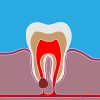A Dental Abscess Means Severe Infection And A Serious Periodontal Problem A dental abscess is an infection, typically affecting the root of a tooth and the surrounding gums. What may start as a tooth fracture or an infection of the tooth interior (root) can quickly progress into a more severe problem. Furthermore, when periodontal disease […]
Tag Archives | periodontal disease
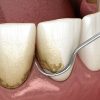
What Is Scaling and Root Planing?
Vital Periodontal Treatment Scaling and root planing improves the health of teeth and gums. When teeth become inundated with plaque or tartar, they may need to undergo scaling or root planing to remove the harmful substance. Without doing so, tartar along the gumline is a known contributor to developing periodontal disease. This condition consists of […]

Dental Calculus
We’re Not Talking About Math! Dental Calculus Is Damaging To Teeth. Dental calculus is simply another name for tartar—a solid, harmful substance that builds up on teeth. Without removing this hardened plaque, teeth become more susceptible to cavities and tooth decay. Additionally, calculus along the gum line will contribute to periodontal disease, which in turn […]
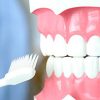
Bleeding Gums: Causes and Implications
Do You Have Bleeding Gums? When brushing your teeth and flossing, there should never be any sign of bleeding gums. However, many people continue to experience this issue. Find out the major causes and possible implications. Periodontal Disease The most severe potential cause of bleeding gums is periodontal disease. An infection of the gum tissue, […]

Bad Breath Embarrassment
Do you have bad breath? It’s more than just embarrassing. Having bad breath is more than just an embarrassment; it can be a sign of health problems. If you or a family member have chronic bad breath (halitosis), or if you notice a sudden change, then contact our office for a consultation. You may be […]
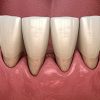
Gum Recession Causes & Effects
Why Gum Recession Matters Healthy gums are crucial to healthy teeth! Gum recession is one of the signs of poor oral health, and it can also cause direct problems to teeth. If you have ongoing gum problems or periodontal disease, call our office today at 619-216-2807. Healthy teeth receive protection from a layer of enamel, […]
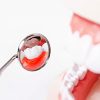
Gum Problems?
Gum Disease Treated Here! Find assistance in your fight with periodontal disease. For those that have it, gum disease is usually a continuing problem. Individuals may experience periods of healing, only to have flare-ups with increased inflammation, irritation, and bleeding gums. During your fight with gum disease, don’t be scared or embarrassed to reach out […]
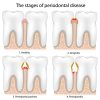
Continuing Care for Periodontal Disease
Ongoing Treatment For Gum Disease Why extra appointments are so important. If you’re diagnosed with gum disease, know that you’re not alone. It’s estimated that half of all adults in the US are affected by some form of the condition (which can also go by names like gingivitis, periodontal disease, and periodontitis). As your care […]

Grow Older with Your Teeth
As we grow older, it’s natural for changes in our mouths, gums, and jawbone to occur. However (thanks to preventive dentistry) people nowadays are keeping their natural teeth longer and longer. Prevent Tooth Loss as you Grow Older Neglect is the main cause of tooth loss, and most problems can be prevented with a simple […]

Why Diabetes Matters for Your Mouth
The Dental Connection to Diabetes The first symptoms are often oral problems More and more, we realize there’s a relationship between infections in your mouth and inflammation caused by diabetes. And neglecting one makes the other worse! Make sure your blood glucose is controlled. If you have diabetes, uncontrolled blood glucose makes you more susceptible […]
